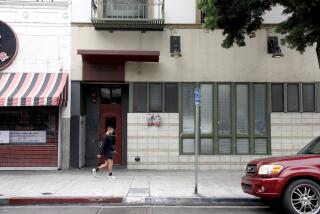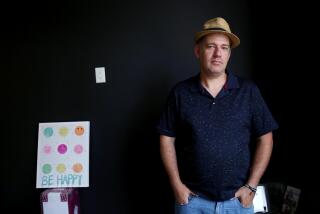Developer Was Approached in Deal : Land: The San Dimas mayor and his partner were planning to buy city-owned property for $805,000. Meanwhile, they talked to a home builder about buying the acreage from them for $1.6 million.
- Share via
Before the collapse of their deal to buy five acres of city-owned real estate for the bargain price of $805,000, San Dimas Mayor Terry L. Dipple and his business partner quietly tried to sell the property to a major home builder for $1.6 million, the builder revealed last week.
“This would have been the deal of the century,” said an outraged Pomona Mayor Donna Smith, who from the start had opposed selling the land to Dipple and his partner, Brian Barbuto.
Dipple tried to sell the land for $1.6 million to Kaufman & Broad, one of Southern California’s largest home builders, in May after he had rejected the company’s offer of $1.28 million. All the while, he was publicly insisting that Pomona was getting a fair price--$805,000--for the site at the San Bernardino Freeway and Corona Expressway.
Dipple denied, however, that he and his partner were acting as speculators on land they had tied up in escrow for more than a year with a $10,000 deposit.
“We were not shopping the property,” Dipple said. “They (Kaufman & Broad) made an offer to us. We countered. We never heard back from them.”
Dipple also said he and his partner are prepared to develop the land themselves and will go to court to compel Pomona to sell them the property if the city does not do so voluntarily. Pomona officials moved to terminate the sale earlier this month, contending the deal had languished too long in escrow.
Smith said the fact that Dipple and Barbuto were trying to sell the land for nearly twice the price they were paying Pomona confirms her suspicions that the deal was a bad one from the beginning.
No one has suggested that anything was done illegally. Still, if the deal had gone through, Smith said, Pomona would have been in an embarrassing position. She said it would look bad for the city to have sold freeway frontage at a bargain price while it is so financially strapped that it laid off 16 employees and imposed $4 million in new taxes this year.
In approving the sale in April of last year, the City Council ignored an appraisal that said the property was worth $1.4 million. It also made special efforts to overcome legal obstacles to the unusual deal, which did not involve competitive bidding. At the time, council members said they accepted the lesser offer because they believed it was the best they could do.
The deal called for Dipple and Barbuto to buy the property for $805,000, plus spend an estimated $155,000 on landscaping and fencing on property across the street from the development. The partners put $10,000 into escrow, promising the remainder after certain conditions were met, including rezoning.
Smith and Councilman Tomas Ursua criticized the deal, pointing out the price was far below the appraised value and came without any solicitation of bids from other developers.
City Atty. Arnold M. Glasman told the council there were two legal problems with the deal. First, the city had acquired the land from the state in 1974 for a park and had promised in a resolution to use the land for “public purposes.” Glasman overcame this obstacle with an opinion that said the city’s resolution expressed only a non-binding intention to create a park, not an ironclad promise to do so.
A more difficult problem, Glasman said, was that the sale of property for below-market value without open bidding could be construed as a gift of public funds, which is illegal. But, Glasman said, this could be surmounted by determining that the transaction would serve a public purpose.
The council then passed a resolution declaring that the sale served a public purpose by providing new jobs and revenue to the city.
The deal was approved by a vote of 3 to 2. Of the three council members who cast favorable votes, only Councilwoman Nell Soto is still on the council; C.L. (Clay) Bryant was recalled last year, and Mark A.T. Nymeyer did not seek reelection in March. Soto said recently: “I thought it was a good deal at the time.”
Dipple had told city officials that he and his partner would construct industrial buildings on the property, which is now used as a community garden. They applied for a zone change from open space to manufacturing.
But city officials said Dipple and Barbuto seemed in no hurry to obtain zoning approval or pursue their development project. Barbuto said the delays were caused by the city, not by him and his partner.
Last December, Dipple sent a letter to the city saying that a “soft industrial real estate market” had led him to conclude that he could not build and sell industrial buildings for at least two years. He proposed townhouses instead.
Seven weeks later, he asked the city to ease the financial terms of the sale so that he could pay $405,000 at the close of escrow, and the remainder of the purchase price up to a year later, at 10% interest.
Dipple said the city never responded to his request.
But city officials said they informed Dipple that they would not agree to residential development without renegotiating the sales price. City Administrator Julio Fuentes said comparable property was being sold for residential development at more than $6 a square foot, compared to the $3.70 being paid by Dipple and Barbuto.
Dipple said the partners were willing to adjust the price but it was impossible to establish the value of the property for residential use without knowing how many units the city would allow. He said the city was unresponsive to his inquiries about residential development.
The partners said they approached the city with the idea of residential construction months before receiving the offer from Kaufman & Broad.
Mitchell Bradford, forward planner for Kaufman & Broad, said his company submitted an offer in April through San Dimas broker Michael Cirrito of Investors Trust to buy the land for $1.28 million to build 80 townhouses. He said Dipple replied a month later with a counter offer of $1.6 million, and his company then lost interest because the price was too high.
City officials said they were unaware of Kaufman & Broad’s interest in the property. Dipple told The Times July 2 that it was obvious that the $805,000 price was fair because no buyer had offered to pay more. Last week, he said he had been referring to buyer interest last April, when the council agreed to the sale, and not to any offers that came in after that.
By July 1, the deal had all but unraveled. That day, the City Council met behind closed doors under a provision of the state’s open meetings law that allows real estate negotiating instructions to be issued privately. During that session, the council told the city attorney to terminate the sale to Dipple and Barbuto.
Since then, Glasman said, he has notified the escrow company that the deal is off. The city said it can void the arrangement because Dipple and Barbuto failed to deposit an agreed-upon $90,000 in escrow by last February. However, the partners maintain the $90,000 deposit was not required. Whether the original $10,000 that has been held in escrow will be returned to the buyers is not yet resolved, Glasman said.
City officials said the council has not decided whether to put the property on the market and entertain new offers.
Meanwhile, Dipple and Barbuto still want to buy the property, and insist that the city’s efforts to get out of the deal are invalid. Dipple said the partners have spent $80,000 so far on planning and other development work.
Barbuto said a lawyer has drawn up legal papers to sue the city to compel it to complete the transaction if a settlement cannot be negotiated. “No court of law is going to allow the city out of this deal,” he said.
Even if he and Dipple end up making a profit on the transaction, Barbuto said, “that wouldn’t make us sleazeballs.” A rule of business, he said, is to “buy low and sell high.”
But Smith said Dipple should have shown more concern for the taxpayers of Pomona since he is the mayor of a nearby city. “Neighbors,” she said, “don’t dump on each other.”
More to Read
Sign up for Essential California
The most important California stories and recommendations in your inbox every morning.
You may occasionally receive promotional content from the Los Angeles Times.













